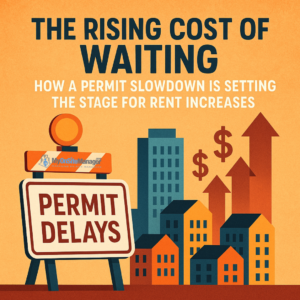In recent years, the U.S. rental market has seen rapid changes—pandemic booms, record apartment deliveries, and temporary rent corrections. But according to a new article from Morningstar and PR Newswire, we may be entering yet another phase: one where a significant slowdown in multifamily permits could lead to renewed rent hikes just a few years down the line.
Let’s dive into what’s happening—and why renters and landlords alike should be paying close attention.
Multifamily Permits Fall Below Pre-Pandemic Levels
The data is clear: in 2024, new permits for multifamily construction have dropped below pre-pandemic norms. After years of aggressive building to meet pent-up housing demand, developers are pulling back. This slowdown means fewer apartment buildings will be completed in the coming 12 to 24 months.
While today’s rental market may still be benefitting from the surge of projects that broke ground during the post-pandemic boom, this pipeline is quickly drying up. Once these units are leased and absorbed, there may be little new inventory to replace them—putting upward pressure on rents.
Why Are Builders Pulling Back?
Several factors are driving this sudden cooling of multifamily development:
-
High Interest Rates: With financing costs rising dramatically, many developers are struggling to secure affordable loans for new projects.
-
Elevated Construction Costs: Labor shortages, expensive materials, and regulatory hurdles continue to push construction budgets higher.
-
Economic Uncertainty: Concerns over a potential recession or market correction have made some investors and builders more cautious.
-
Stricter Lending Standards: Banks and financial institutions are tightening their lending criteria for large-scale real estate projects.
The result? Many developers are choosing to “wait and see” rather than move forward with risky new ventures.
Short-Term Rent Relief May Be Temporary
At first glance, renters may feel like this slowdown is good news. After all, many markets are still seeing softening rents due to the large number of apartment completions in 2023 and early 2024. In fact, asking rents have been declining in many of the top 50 metropolitan areas for over a year.
Cities like Birmingham, Cincinnati, and Cleveland, which saw steady permit activity through the pandemic, are now experiencing rent corrections as new supply meets demand.
But the relief may be short-lived. As the supply of new apartments dwindles, the rental market could shift once again, favoring landlords as vacancy rates tighten and competition for available units increases.
Where the Impact May Be Most Severe
The slowdown in multifamily permitting isn’t happening evenly across the country. According to the article, some high-demand markets are especially vulnerable:
-
New York City
-
Boston
-
San Jose
-
Baltimore
-
Washington, D.C.
These cities are already facing housing shortages and affordability challenges. With fewer new apartments in the pipeline, they may see rents rebound faster and climb higher than the national average.
On the other hand, regions that continued issuing permits more aggressively during the pandemic may remain better balanced—at least for now.
A Return to a Landlord-Friendly Era?
The housing market is cyclical, and some experts believe we’re entering a new phase where conditions once again tilt in favor of landlords. According to RealPage data cited in the Morningstar article, vacancy rates are stabilizing, and lease-uptake rates have increased from their mid-2023 lows.
If new supply continues to shrink while demand remains steady or grows, landlords may regain pricing power in many U.S. rental markets by late 2025 and into 2026.
What Does This Mean for Renters and Investors?
-
For Renters: If you’re considering moving or renewing your lease, now may be a good time to lock in more favorable terms before the next wave of price increases arrives.
-
For Property Owners: The current slowdown in development may create new investment opportunities, as limited future supply could boost occupancy rates and rental income.
-
For Policymakers: The data underscores the importance of incentivizing new construction to maintain affordability and prevent future housing crises.
In Summary: The Clock Is Ticking
The multifamily construction slowdown serves as both a short-term reprieve and a long-term warning sign. While renters may temporarily benefit from recent apartment completions, today’s reduced permitting activity sets the stage for tighter housing supply—and likely higher rents—in the near future.
As always, careful monitoring of local market conditions will be key for renters, landlords, and policymakers alike as we navigate this shifting landscape.
Source:
Morningstar/PR Newswire. Fewer Multifamily Permits Today Could Mean Costlier Rents Ahead. March 19, 2025.
Read the full article here

